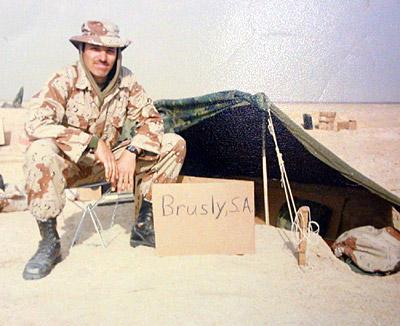Meaghen Couvillon, an anthropology freshmen, was only 7 years old when her father was sent to Kuwait during Desert Storm. Now, she is 19 and is reliving that same reality as her father waits to be deployed to Iraq from California.
The United States war with Iraq has caused many members of the campus community, especially veterans of different wars, to rehash their different experiences and ideas on the war with Iraq.
Lt. Col. David Couvillon, Meaghen’s 46-year-old father and a battalion commander for 3rd Marines 23 Battalion was a part of the lost infantry battalion in Desert Storm, said his wife Sharon Couvillon.
He is now captain of the Weapons Company unit being deployed to Iraq, said Sharon, whose first date with David was to a University basketball game.
In his journals detailing his feelings before he went to Desert Storm, David said, “Sharon was still awake when I went to bed. She asked if that was ‘the call.’ I answered yes and explained what I knew to that point. She began to cry, and I held her close. I was more excited than any time I remember. I lay awake long into the night.”
Brig. Gen. James Joseph Hourin, a 63-year-old retired member of the U.S. Air Force, was 29 when he went to Vietnam.
He said there are many significant differences between Vietnam and the war in Iraq.
“The most significant is we’re fighting this war to win it,” Hourin said. “We were just limiting North Vietnam’s ability to take over South Vietnam — it never went to this extent.”
Similarly, Robert Whittaker, a 26-year-old Second Lieutenant in the 244th Aviation Battalion out of New Orleans, went to Bosnia from April 2000 to November 2000 and sees significant differences in the two wars.
Bosnia was a peace-keeping mission, and Iraq is an invasion.
“With an invasion, you have an organized enemy,” Whittaker said.
Whittaker has a good chance of being deployed out to Iraq once he finishes flight school, he said.
“I don’t want my unit to go without me,” he said. “Put me in, coach, I’m tired of sitting on the bench.”
History professor Charles Royster attributes most of the differences in the wars to the role of technology.
“You see it on TV, you see it on aircraft carriers, satellites and Global Positioning Systems,” Royster said. “But you still have to have human beings on the ground.”
He said technology played a big role in World War II with the atomic bomb, but other than that, the technology was relatively crude compared to now.
Hourin agreed. He said one main difference between the Vietnam War and the war in Iraq is the weapons are much more advanced and accurate now.
Like Whittaker, Hourin also thinks this is a real war — in which the president and his administration have decided to take action and win.
The reason of protecting the American people is similar to reasons for which the United States went into Vietnam and got involved in World War II, he said.
The difference is there was not much of a threat of a German or Japanese attack in the United States then, but now, terrorists have the ability to attack the United States in this country, Hourin said.
“It’s the same reason, but U.S. security is more critical now than in World War II,” Hourin said.
Meaghen asked her father why the military did not take care of Saddam Hussein in Desert Storm. David said they only wanted Hussein out of Kuwait; now they want him completely out of power.
During Desert Storm, David’s battalion was part of the attack on the Kuwaiti airport, and after they took over the airport, the military left him there, Sharon said.
David’s absence was difficult on his family, especially Meaghen, who understood but refused to write to him, Sharon said.
“Everyone thought a month was reasonable,” she said. “But after mid-March, people started getting aggravated — they didn’t do a good job with scheduling.”
For Sharon, this time is different because then, she had 4- and 7-year-old children, and now they are 16 and 19, wanting to be adults.
The difference is she has been through this already and hopes nothing is going to happen but understands more now and knows she has to keep on going and not stop her life, she said.
The main difference for Sharon is the danger level has increased because the troops are going into Iraq and not just staying on the borders.
“The war will last longer, and the occupation will last longer,” she said.
Couvillon’s orders are to stay in Iraq for one to two years. He only served six months in Desert Storm, she said.
“I’m tired,” Sharon said. “The best thing is not to watch it all the time — last time it was CNN, this time it’s FOX — you’ll be better off occupying your mind with other things.”
Each family member is dealing with his absence in different ways, Meaghen said.
Her brother, Garett, 16, does not remember Desert Storm, so Couvillon’s leaving is hitting him harder than Meaghen and Sharon.
“My mom’s not too thrilled that I’m doing so well,” Meaghen said. “I’m trying to not let it affect me — I’m in survival mode.”
Soldier stories, now and then
April 9, 2003

Soldier stories, now and then



